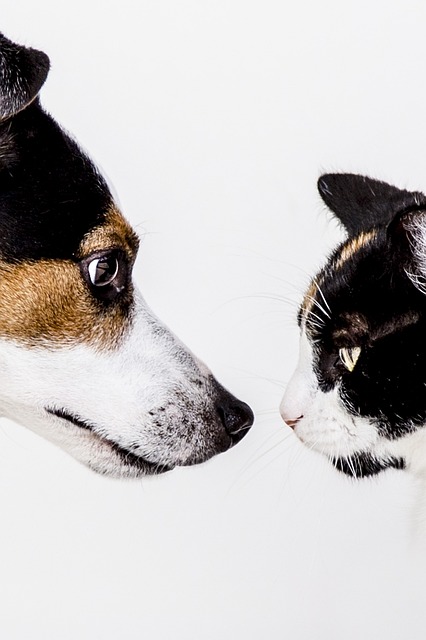 JR writes: “I was listening to Wacky Wednesday on Women of Grace June 19, 2024.
I would be greatly interested if anyone has conducted a survey as to cancer in pets for people who use Essential oils in diffusers. I have known several pet owners who lost their dogs to lung cancer.”
JR writes: “I was listening to Wacky Wednesday on Women of Grace June 19, 2024.
I would be greatly interested if anyone has conducted a survey as to cancer in pets for people who use Essential oils in diffusers. I have known several pet owners who lost their dogs to lung cancer.”This is a very good question and it didn’t take me long to find quite an extensive collection of research on the issue of essential oils and pets.
The problem has become more pronounced in recent years with the rising popularity of essential oils which are used in diffusers, cleaning products, herbal remedies, and perfumes. Because these oils are simply plant compounds that are extracted by distillation, they are generally assumed to be safe, natural alternatives to chemical-based products; however, this is not necessarily true as some essential oils are actually toxic to both humans and animals.
Most of the veterinary sites that I visited when researching this topic urged extreme caution when using essential oils around pets. While certain oils work well for protecting pets from fleas and calming their separation anxiety, the indiscriminate use of these oils has caused serious problems in pets.
As the Animal Emergency Center (AEC) advises, “All pet owners should be aware of the potential toxiticy of essential oil products. Essential oil toxicosis in veterinary patients can vary depending on the oil content. Symptoms range from mild gastrointestinal upset or vomiting, diarrhea and anorexia to neurologic signs involving ataxia or disorientation, seizures, coma and even death. Cats appear to be more sensitive to ingestion, resulting in more severe side effects.”
 They list the following essential oils as being toxic to animals:
They list the following essential oils as being toxic to animals:
• armoise • bitter almond • boldo leaf • buchu • calamus • horseradish • lanyana • large wormwood • mustard • pennyroyal • southernwood • tansy • thuja • tree wormwood • western red cedar • wormseed • wormwood
The following essential oils are potentially toxic (dose / exposure dependent). They are typically more sensitive to cats:
• basil • bay leaf • birch • citrus • cinnamon bark • clove leaf • corn mint • hyssop • myrrh • oregano • peppermint • pine • sassafras • savin • savory • tarragon • tea tree • wintergreen • ylang ylang
 The AEC explains the dangers of these products, such as tea tree oil that is found in pet products such as shampoos and flea products. Even though they contain very low concentrations of this oil, they can still cause serious side effects in pets. “Clinical signs may develop up to 12 hours after exposure and include hypothermia, ataxia, dehydration, nervousness, trembling, paralysis, CNS depression (coma) and fatalities. Increased liver enzyme levels may be observed.”
The AEC explains the dangers of these products, such as tea tree oil that is found in pet products such as shampoos and flea products. Even though they contain very low concentrations of this oil, they can still cause serious side effects in pets. “Clinical signs may develop up to 12 hours after exposure and include hypothermia, ataxia, dehydration, nervousness, trembling, paralysis, CNS depression (coma) and fatalities. Increased liver enzyme levels may be observed.”
Pennyroyal oil, which is also found in some flea products, have also proven problematic for pets who can become symptomatic within one hour of exposure. If not treated promptly, they can become listless and experience vomiting, diarrhea, epistaxis, and death. This oil is known to cause liver necrosis.
“Wintergreen oil is readily absorbed through the skin. It contains a glycoside which is hydrolyzed and releases methyl salicylate which is toxic to dogs and especially cats. Clinical signs are depression, anorexia, emesis, gastric hemorrhage, toxic hepatitis, anemia, bone marrow hypoplasia and pyrexia.”
The American Kennel Club urges pet owners to be wary of any natural flea and tick product. “Since there is a lack of data supporting the success of these products, owners who use them may put their dogs at risk for flea and tick-borne diseases, so ask your veterinarian for advice about the best way to incorporate essential oil-based flea and tick control into your dog’s treatment plan.”
Another danger is sassafras oil which is commonly used to sooth external insect bites and stings. The main constituent in this oil is safrole which is a known carcinogen.
“Citrus oil and some citrus formulations (sometimes found in insecticide formulations for dogs and cats) can cause hypersalivation, muscle tremors, ataxia, CNS depression (coma) and fatalities. Pure citrus oil can be fatal especially in cats. Cats are also sensitive to lavender and thyme oil.”
VCA Animal Hospitals sites the following signs that your pet may be experiencing side effects from essential oils:
• difficulty breathing • difficulty walking or uncoordinated gait • drooling • lethargy or weakness • muscle tremors • pawing at the mouth or face • redness or burns on the lips, gums, tongue, or skin • vomiting (you may detect the smell of essential oils in the vomit)
Rapid treatment is imperative in saving your pet’s life. They recommend contacting your vet or the Pet Poison Helpline (800-213-6680) which is a 24/7 animal poison control center, immediately.
As WebMD advises: “Try not to use essential oils if you don’t have professional guidance. The chemicals in these oils are taken up quickly by the dog’s body and go straight to the liver for metabolization. This means that essential oils could be an issue for younger dogs, elderly dogs, and dogs with liver problems.”
As is the case with the human use of essential oils, when it comes to our pets, it is imperative that we don’t mistake natural for safe!
© All Rights Reserved, Living His Life Abundantly®/Women of Grace® http://www.womenofgrace.com
